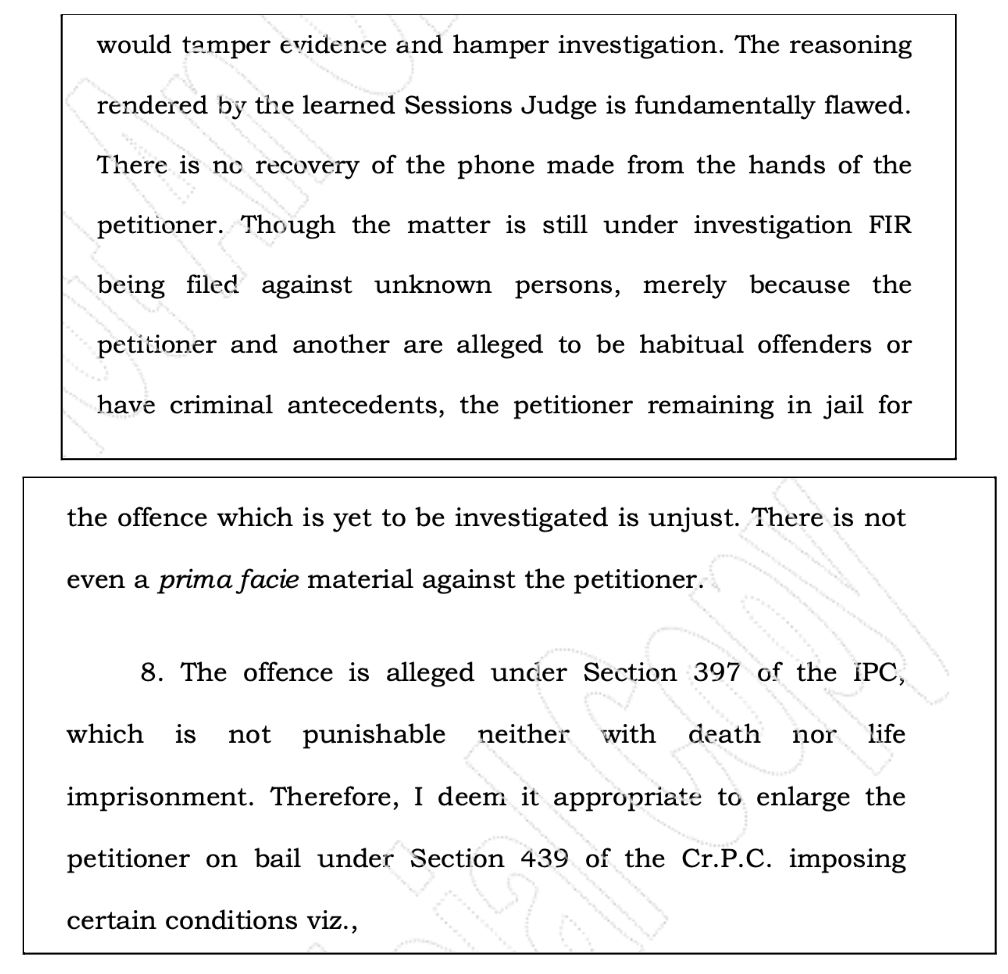In this week’s review of Court Judgments, we look at the Supreme Court’s observation regarding quashing of criminal proceedings by the High Court, Kerala High Court’s order on fixing liability regarding an electrocution death case, Madras High Court’s observation regarding a Citizenship resumption case and Karnataka’s high court order on the bail application.
Supreme Court: ‘No Useful Purpose Will Be Served’ cannot be a reason to quash criminal proceedings
A Supreme Court Bench comprising of Justice MR Shah and Justice BV Nagarathna observed that if there is a clear case regarding the alleged offences, the criminal proceedings cannot be quashed on the premise that ‘no useful purpose will be served by prolonging the proceedings of the case.’
This observation was made in the case, Satish Kumar Jatav vs. the State of U.P. & Ors., and stated that the High court needs to make a well-reasoned order to dispose such petitions regarding Section 482 of the Code of Criminal Procedure.
As per the details of the case, the accused was summoned for trial for offences punishable under Sections 307, 504, 506 of IPC and Sections 3(10)(15) of Scheduled Castes and Scheduled Tribes (Prevention of Atrocities) Act. The accused challenged the order in the Allahabad High Court.
The high court quashed the criminal proceedings stating that no useful purpose shall be served by prolonging the proceedings of the case. This was appealed in the Supreme Court with the contention that the High Court did not provide any reasons for quashing the criminal proceedings.
Supreme Court took cognizance of the appeal and noted that the High Court has discussed neither the allegations against the accused nor the legality of the initial order against the accused.
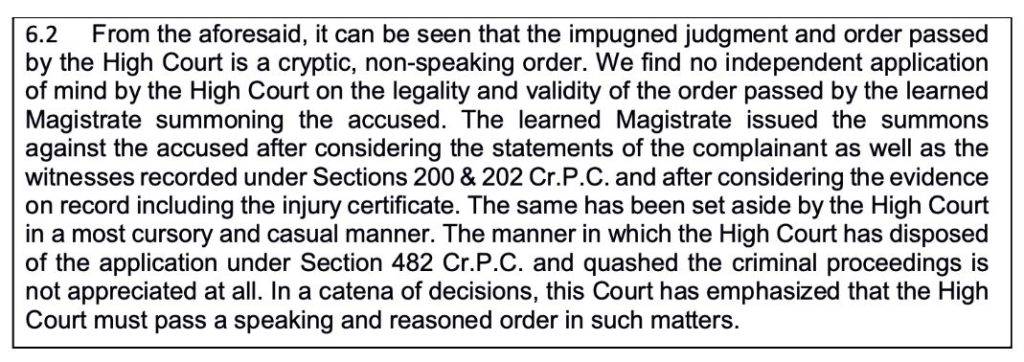
The Supreme Court stated that the High court’s reason to quash the criminal proceedings does not serve as a good ground especially when there is a clear case regarding the offences.
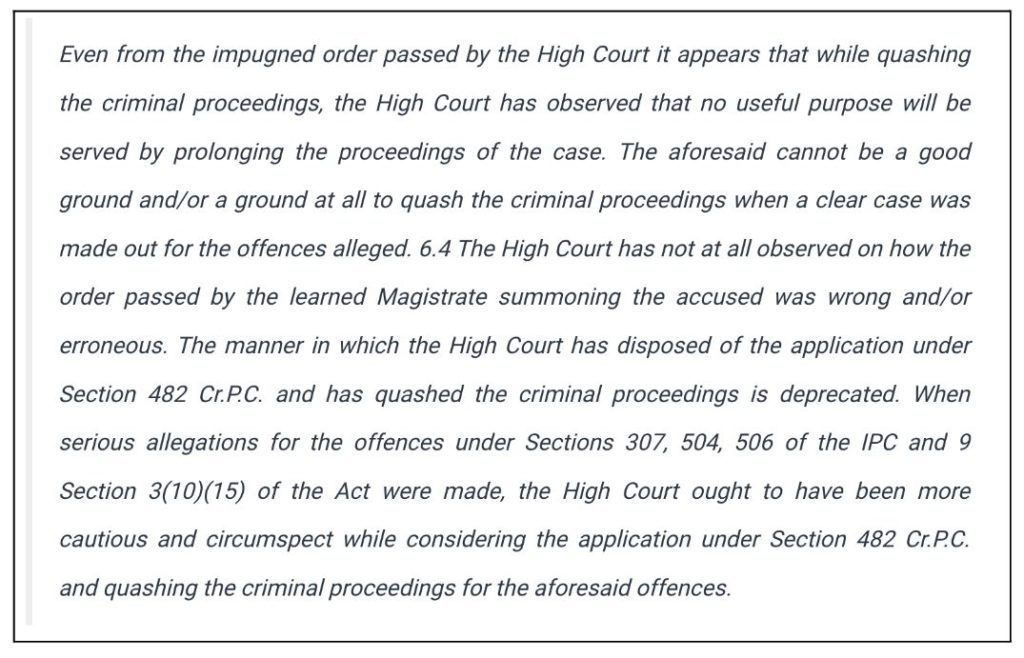
The Supreme Court allowed the appeal quashing the order issued by the Allahabad High Court, thereby reinstating the initial order of the magistrate summoning the accused.
Kerala HC: State Electricity Board liable for the death of a man electrocuted while boarding a bus in contact with a loose wire
In the case where a person died due to electrocution by boarding a bus which was in contact with a hanging electric line, Kerala High Court stated that the Kerala State Electricity Board (KSEB) is equally liable for negligence apart from the driver.
In the case National Insurance Co. Ltd vs. Narayani & Ors, Justice M.R. Anitha held that it is the duty of KSEB to maintain the electrical equipment and accessories and avoid danger from them to the public.
As per the details of the case, a person, Krishnamurthy was electrocuted to death while stepping onto a bus which was in contact with an electric line hanging over the road. His family moved to the ‘Principal Motor Accidents Claims Tribunal’ seeking compensation for his death. They claimed that the owner of the bus, driver, insurer and KSEB was liable to compensate. KSEB is liable since they did not take proper safety measures to tighten the hanging electric conductor to prevent the accident.
The Tribunal held that KSEB was not negligent, and the accident occurred due to the negligence of the bus driver and directed the insurer to indemnify the insurer. The insurer was aggrieved by the tribunal’s order and moved to the High Court.
It was argued by the appellant i.e., the insurer that the police charge was against both the driver and KSEB. The standing counsel of KSEB also agreed that the area was affected by lightning, thereby causing the line to be detached.
The tribunal’s basis for exonerating KSEB was that the line was not separated and was only hanging. But the court contended that it is not necessary for the line to be separated and it is the responsibility of KSEB to take measures to avert danger to the public.

The High Court Judge presiding over the case observed that the Tribunal ought not have let off KSEB.
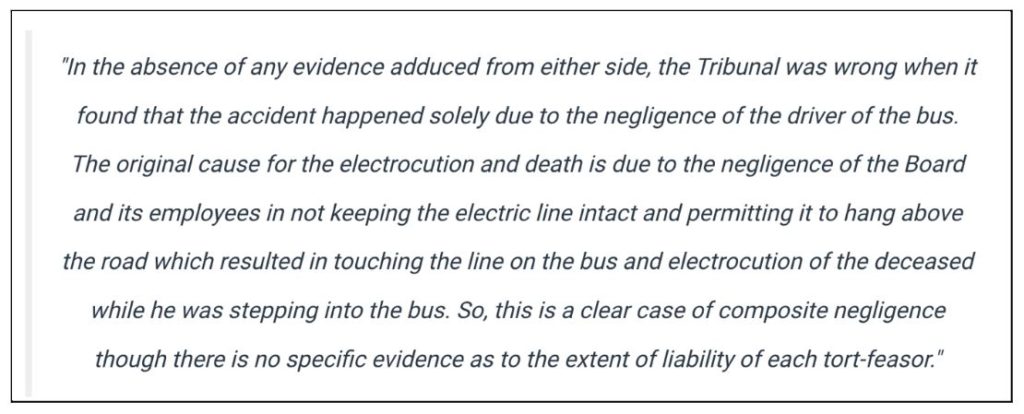
It observed that this is a case of composite negligence and hence the order of the tribunal was set aside.
Madras HC: Entitlement to the resumption of Citizenship can’t be denied to a child who was in the womb at the time of renunciation by the parents.
Madras High Court has observed that a child who is still in the womb of the parents at the time of them renouncing their Indian Citizenship, needs to be treated as a ‘minor’ and is entitled to the resumption of his Indian Citizenship according to Citizenship Act.
This observation was made by Justice Anita Sumanth of Madras High Court in the case of Pranav Srinivasan vs. The Government of India. The High Court received a plea challenging the rejection of an application for Resumption of Citizenship under Section 8 of the Citizenship Act, 1955. The parents of the appellant renounced their Indian Citizenship in December 2018 and obtained citizenship of Singapore. The petitioner was a foetus of about 7 & half months at that point and was born in March 1999. By virtue of birth, the petitioner has acquired Singapore citizenship.
After attaining the age of majority, he made a declaration in Indian Consulate at Singapore in March 2017 seeking resumption of his Indian Citizenship. Article 8 of the Indian Constitution was cited, stating that is specifies the mechanism to determine the citizenship of persons of Indian origin. The petitioner applied for citizenship stating that both his parents were citizens of India, and his grandparents still hold Indian Citizenship.
However, the court observed that Article 8 only provides for certain entitlements subject to the procedures being fulfilled. The declaration at the consulate was not accepted by the authorities as per the procedures in Section 5 of the Citizenship Act.
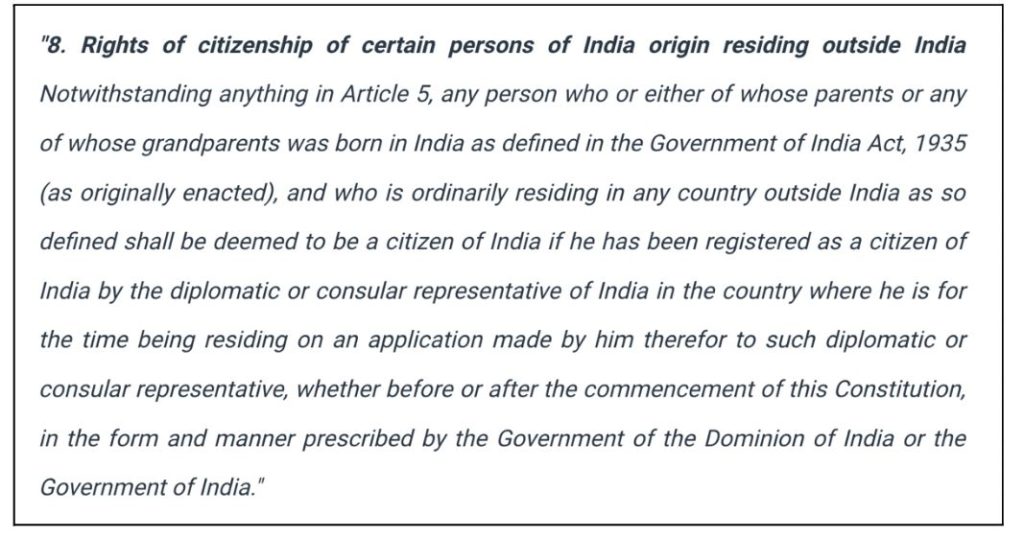
Now, the question before the court was to determine whether the child in the mother’s womb would be considered a ‘Minor child’ under Section 8(2) of the Citizenship Act. The single-judge bench highlighted the terminology used in the Act, where-in Section 8(2) mentions ‘minor child’ and not ‘birth unlike other sections in the Act. Hence, it stated that there is a distinction between acquisition of ‘Citizenship by birth’ and acquisition of ‘Citizenship by a minor’ through resumption of Citizenship.
The court observed that as per the provisions in the Citizenship act, a child need not have been born at the time of parents renouncing their citizenship. Therefore, he is entitled to seek resumption of the right to citizenship. Other acts relating to the rights of the unborn child were also discussed by the court.
Further, the United Nations Convention on the Rights of the Child, of which India is a signatory, defines a minor child as every human being below the age of 18 years, where-in no lower limit is mentioned.
In light of the earlier precedents, the court concluded that the petitioner would be considered a minor child and cannot be denied the entitlement for resumption of Citizenship.
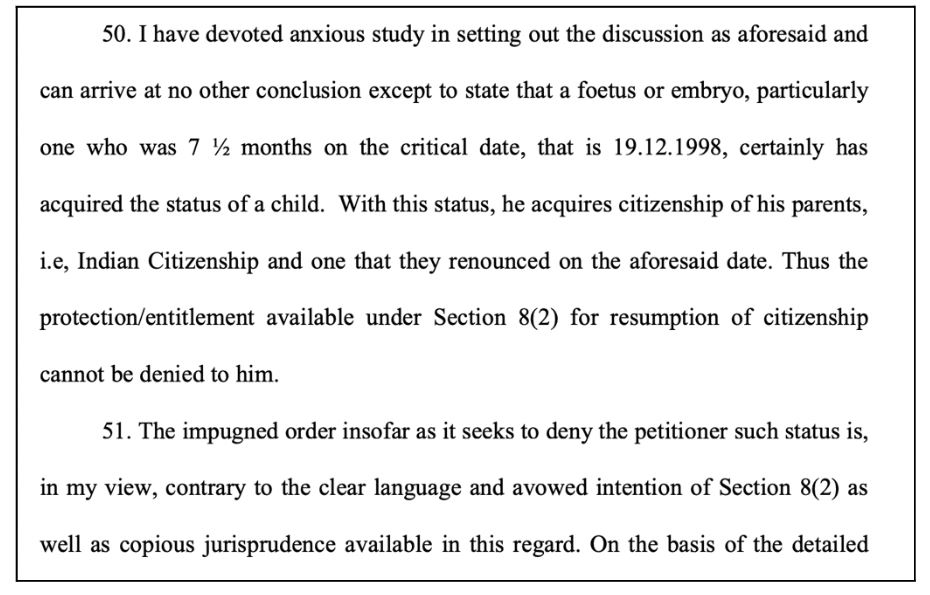
Karnataka HC: It is unjust to deny bail before investigation since the accused is a habitual offender
Justice M. Nagaprasanna of Karnataka High Court observed that it is unjust to deny bail to a person before investigation, based on the allegation that the person is a habitual offender or has criminal antecedents.
In the case Injamam Shariff vs. the State of Karnataka, the petition was allowed and the petitioner was granted bail. The accused was earlier arrested for offences punishable under Sections 397 & 34 of the Indian Penal Code. As per a complaint registered by one T.S. Manoj, two unknown persons came on a motorcycle, while one caught hold of him by threatening with a knife, and the other snatched away his mobile phone.
After a week, the police arrested Injamam Shariff and he was kept in judicial custody. Injamam Shariff filed a petition seeking bail from the Sessions Judge. This application was rejected based on the objections of the State, that the petitioner was a habitual offender and has criminal antecedents with the likeliness of committing similar offences if released.
The petitioner submitted that there was no recovery of the phone from him, and the allegations were baseless. The prosecution opposed the bail plea and stated that the matter is under investigation and the petitioner was apprehended on the criminal antecedents.
The High Court Bench observed that the reasoning of the sessions Judge was flawed. Since the matter is still under investigation, denying him bail based on the allegations of being a habitual offender is unjust. The court further highlighted that the mobile phone is not recovered from the petitioner and there is no prima face evidence against him.
